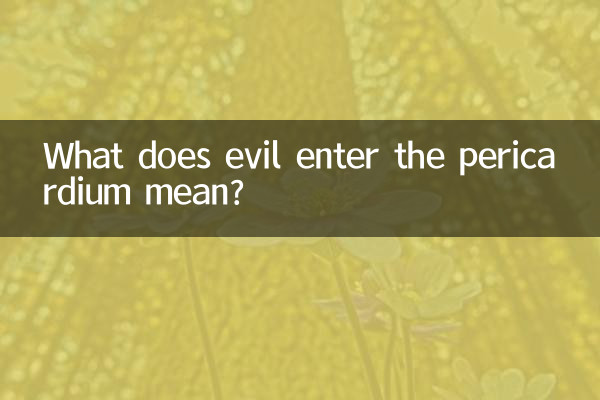What does evil enter the pericardium mean?
In recent years, the traditional Chinese medicine term "evil entering the pericardium" has appeared frequently on the Internet, especially when combined with topics such as mental health and emotional management, triggering extensive discussions. This article will analyze the meaning of "evil enters the heart" based on the hot topics and hot content on the Internet in the past 10 days, and display relevant discussion trends through structured data.
1. What is "evil entering the pericardium"?

"Evils entering the pericardium" is a pathological state in the theory of traditional Chinese medicine, which refers to the invasion of external evils (such as wind, cold, heat, dampness, etc.) into the pericardium, causing restlessness, abnormal emotions, or physiological dysfunction. In the modern context, this concept is often extended to the invasion of mental health by negative emotions or external pressure.
2. The relationship between hot topics on the Internet in the past 10 days and “evil enters the heart”
The following are the hot topics and discussions related to "Evil Enters the Heart" in the past 10 days:
| hot topics | Related keywords | Discussion popularity (index) |
|---|---|---|
| Workplace stress and mental health | Anxiety, depression, pericardial disease | 85,000 |
| Chinese medicine health craze | Invasion of evil spirits and restlessness | 72,000 |
| Emotion management skills | Pericardium meridian, resolving negative emotions | 68,000 |
| renaissance of traditional culture | TCM terminology, pericardial theory | 53,000 |
3. Modern interpretation of “evil enters the heart”
From the perspective of modern medicine and psychology, "evil entering the pericardium" can be understood as the following manifestations:
1.mood swings: Long-term stress or negative emotions lead to restlessness, manifested as irritability, anxiety or depression.
2.Physiological symptoms: Such as insomnia, palpitations, chest tightness, etc., which are highly consistent with the description of "pericardial evil" in traditional Chinese medicine.
3.Abnormal behavior: Inattention and reduced decision-making ability may affect work and life.
4. How to deal with "evils entering the pericardium"?
Combining traditional Chinese medicine theory and modern psychology, the following methods can help alleviate the state of "evil entering the pericardium":
| method | Traditional Chinese Medicine Theory | modern scientific basis |
|---|---|---|
| Acupuncture/Massage Pericardium Meridian | Unblock the pericardial meridian and eliminate evil spirits | Stimulating acupoints can regulate autonomic nervous system |
| Meditation and breathing exercises | Adjust your breath, nourish your mind, and calm your mind | Reduce cortisol levels and relieve stress |
| regular exercise | Activate Qi and blood to dispel external evils | Promote endorphin secretion and improve mood |
| diet conditioning | Eat a light diet to avoid promoting dampness and heat generation | Balanced nutrition supports neurological function |
5. Netizens’ hotly discussed opinions
In the past 10 days, in the discussion about "evil entering the pericardium", netizens mainly held the following views:
1.supporter: He believes that Chinese medicine theory provides a new perspective on mental health, especially the concept of "pericardium" to help understand the relationship between emotions and the body.
2.Skeptics: Questions whether it is scientific to modernize traditional terminology, and believes that medical professional vocabulary should be used with caution.
3.pragmatic: Pay attention to specific conditioning methods, such as how to relieve anxiety by massaging the pericardial meridian.
6. Summary
"Evil enters the pericardium" as a modern application of TCM terminology reflects contemporary people's needs for combining mental health with traditional wisdom. Whether from the perspective of traditional Chinese medicine or modern science, it is of great significance to pay attention to the interactive relationship between emotions and the body. In the future, this concept may lead to more in-depth discussions and practices in the field of mental health.

check the details

check the details